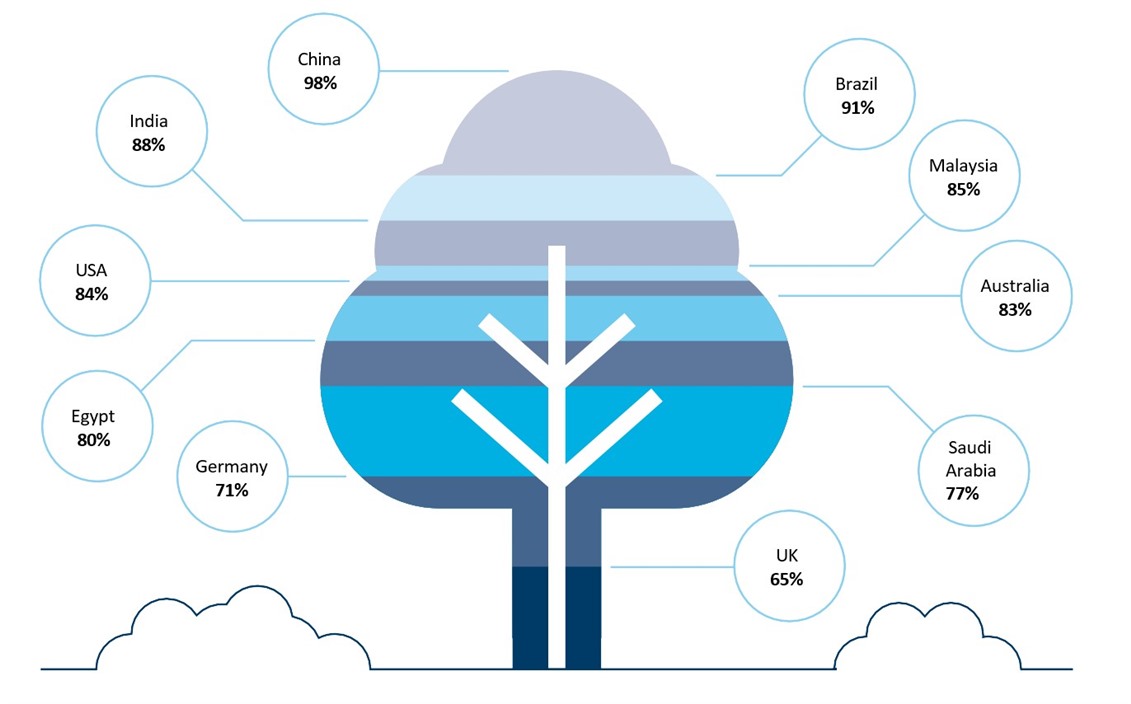How are engineering employers thinking about climate change? The IET’s latest annual skills survey tells us…
Climate change is worrying engineers and their businesses around the world. In China, this nervousness is shared by 98% of engineering organisations surveyed. That figure declines to 91% in Brazil. Even in the UK, the country least anxious about the issue, 65% of respondents said they are concerned or very concerned about the impact of climate change on their engineering business.

Southern discomfort
As we can see, it is countries in the global south that are most worried by the risks associated with global warming. When the subject moves to resilience in the face of the potential consequences of a heated world, it is these countries, such as Saudi Arabia, Malaysia, and China, who most doubt their ability to respond.
Even so, only up to 4% of engineering businesses in eight of the countries surveyed believe they have the skills to be resilient to climate change. The most optimistic are the UK and Australia, even so, only 10% of British respondents and 7% of Australians would say they have all the skills they require. Only 4% of engineers in Germany and the US would say they have the skills they need. In China, that falls to 1%.
What is to be done?
While global warming is reasonably uniform in worrying engineers, they vary in what skills they think will give them the resilience they need to cope with a heated planet. Malaysian engineers say they need to be able to solve complex problems. In China, respondents said their resilience would be boosted by more digital skills and were twice as likely to believe this than their counterparts in the UK. Saudi Arabia and Germany opted for whole systems thinking as their top answer. Egyptian engineers believe technical and engineering skills are what they most need to build resilience.
Supply chain blues
One commonality is a response to climate change in supply chains. Our survey found 89% of organisations (except for the UK) have noticed supply chain changes, in which increased cost is the most common factor. In China, almost all engineering employers have found a climate change related supply chain alteration. This includes using different suppliers, or partners ending their sale of particular goods and services that were previously used.
In Germany, 93% of organisations say they are still seeing a reaction within their supply chains, despite the country having the second lowest level of concern about climate change.
As we have seen, there is broad agreement that climate change is a major, and dangerous issue. But there is no particular international consensus on what skills will best help engineers respond.
Faith in people
Despite the apparent gloom, companies around the world do have faith in their workforces, saying their staff have the agility to apply their skillsets to new circumstances and adapt to new technology. The outlier here is the UK. Some 30% of British respondents believe their workforce lacks the ability to change and adapt, double the response of other surveyed countries.
There are insights to be gained from these responses and numbers. One is a correlation between the levels of concern about climate change in a country, the response of their associated supply chain and their faith in the agility and skillset of their employees.
An outlying island
The stand outs are organisations surveyed in Europe. German and British employers are least concerned by climate change. Britain is especially noteworthy, with the least worry for climate change, the lowest supply chain response and most confidence in the resilience of their staff, but least belief in their agility. On the other hand, Germany has the most confidence in staff agility, but not their resilience.
#GreenSkills